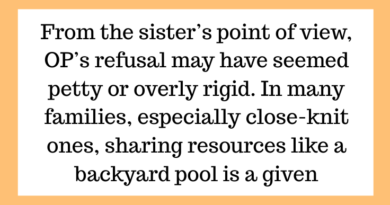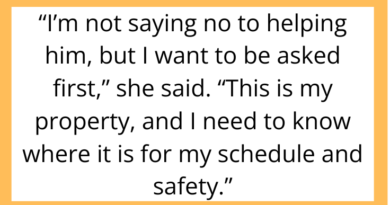AITAH for Not Letting My Partner Name Our Baby After His Ex?
Bringing a child into the world is meant to be one of the most joyful shared experiences between partners. But what happens when an unexpected name suggestion turns a moment of unity into emotional chaos? A recent AITAH post dove headfirst into that awkward territory—and it left readers stunned.
In this blog post, we unpack the complex layers behind this dramatic situation: loyalty, emotional baggage, naming traditions, and where to draw the line between compromise and boundaries.
The Situation: A Name That Raised Eyebrows

The original poster (OP) and her partner were expecting their first child. After weeks of back-and-forth over baby names, her partner suggested a name that, to OP’s surprise, sounded very familiar. When she asked where it came from, he admitted—reluctantly—that it was the name of his ex-girlfriend, someone he was with for five years before they broke up.
OP was stunned. She asked him to reconsider, explaining it felt deeply inappropriate and disrespectful. He responded by saying she was being “irrational,” and that the name had “nothing to do with the ex anymore”—he just thought it was beautiful and meaningful.
The conversation spiraled. Now OP is left wondering: Am I the ahole for putting my foot down on this?**
Why Names Carry Emotional Weight

Names are not just labels. They’re loaded with symbolism, personal memories, cultural heritage, and sometimes… ghosts from the past. In romantic relationships, suggesting a name with obvious ties to an ex can feel like reopening emotional doors that were supposed to be closed.
Here’s why this rubbed so many people the wrong way:
-
Perceived emotional attachment: If your partner wants to name your child after their ex, what else are they holding onto?
-
Undermined trust: Even if intentions were innocent, the lack of transparency can feel like a betrayal.
-
Disrespectful timing: Pregnancy is a time to support one another—not trigger unnecessary emotional conflict.
Where Do You Draw the Line in Baby Name Negotiations?

Naming a child is deeply personal and ideally collaborative. But there are some unspoken rules that many couples seem to agree on:
-
No names of exes. Period. Even if it’s “just a coincidence,” it’s rarely neutral.
-
Mutual veto power: If one partner feels uncomfortable about a name, it should be off the list—no debate.
-
Respect the dealbreakers: For one person it may be a disliked teacher; for another, an ex. Both should be valid.
OP’s boundary was clear: she didn’t want her child associated with someone from her partner’s past. That doesn’t make her controlling—it makes her emotionally aware.
How Reddit Responded

The responses to OP’s post were overwhelmingly in her favor. Top-voted comments expressed disbelief at the partner’s suggestion and rallied behind OP for standing firm.
Some responses included:
“There are thousands of beautiful names. Pick literally any other one.”
“It’s not irrational to not want your child named after the ghost of your partner’s past.”
“This sounds like emotional residue your partner needs to deal with—not you.”
Others pointed out that this issue might hint at deeper emotional attachments or poor communication boundaries.
What Healthy Naming Conversations Should Look Like

If you and your partner are facing conflict over baby names, here’s how to handle it:
-
Have the talk early. Don’t wait until the third trimester to start brainstorming.
-
Use a shared list or app. Tools like BabyName or Namey let you swipe together and find common ground.
-
Be honest about your triggers. If a name makes you uncomfortable, speak up—kindly but firmly.
-
Don’t rush. Choosing a name is a big deal. Give it the time and care it deserves.
A name should symbolize a fresh start—not stir old feelings.
Final Thoughts: Is OP the A**hole?

Absolutely not.
OP isn’t being irrational, dramatic, or controlling. She’s being thoughtful, protective, and honest about her feelings. Asking your partner not to name your child after someone they were previously in love with isn’t just reasonable—it’s a no-brainer for most people.
Relationships require compromise, but not at the expense of dignity, trust, and emotional peace.



